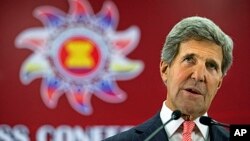BANDAR SERI BEGAWAN, BRUNEI —
U.S. Secretary of State John Kerry meets separately with Turkish Foreign Minister Ahmet Davutoglu and Russian Foreign Minister Sergei Lavrov Tuesday to discuss Syria's civil war. The meetings come on the sidelines of a forum of Southeast Asian nations in Brunei.
In talks with Davutoglu, Kerry says they will discuss "the key role that Turkey can continue to play" with respect to Syria. Turkey is a front-line ally among those backing opponents of Syrian President Bashar al-Assad.
Russia, on the other hand, is selling arms to President Assad's forces and is critical of opposition supporters, such as the United States, that now say they intend to arm the rebellion.
But Lavrov and Kerry continue to work toward Syrian talks on a transitional authority to end the civil war, and that, Kerry says, is the focus of their meeting here in Brunei.
"We remain committed, particularly given the increases in violence, to the notion that there must be a negotiation. And I’ll have that conversation in full with Foreign Minister Lavrov, and hopefully together we might have something to be able to report to you after that conversation," said Kerry.
For Syrian rebels, progress toward a negotiated solution seems especially important following battlefield gains by Assad forces and a renewed fight for control of the city of Homs.
"And we are very much hopeful that the concept of a peaceful resolution, no matter what's happening in Homs, no matter what's happening, is the only way to try to save Syria," Kerry said. "And there is no, as I have said many times, military solution to the problem of Syria. Now the Assad regime wants to move to the contrary. Clearly, part of my conversation with Foreign Minister Lavrov and with the Russians will be how we can maximize our efforts together to have an impact on this."
Kerry and Lavrov had hoped to start these Syrian talks in Geneva in July. But international mediator Lakhdar Brahimi says he believes that date will slip again as opposition politicians continue to struggle over leadership positions.
In talks with Davutoglu, Kerry says they will discuss "the key role that Turkey can continue to play" with respect to Syria. Turkey is a front-line ally among those backing opponents of Syrian President Bashar al-Assad.
Russia, on the other hand, is selling arms to President Assad's forces and is critical of opposition supporters, such as the United States, that now say they intend to arm the rebellion.
But Lavrov and Kerry continue to work toward Syrian talks on a transitional authority to end the civil war, and that, Kerry says, is the focus of their meeting here in Brunei.
"We remain committed, particularly given the increases in violence, to the notion that there must be a negotiation. And I’ll have that conversation in full with Foreign Minister Lavrov, and hopefully together we might have something to be able to report to you after that conversation," said Kerry.
For Syrian rebels, progress toward a negotiated solution seems especially important following battlefield gains by Assad forces and a renewed fight for control of the city of Homs.
"And we are very much hopeful that the concept of a peaceful resolution, no matter what's happening in Homs, no matter what's happening, is the only way to try to save Syria," Kerry said. "And there is no, as I have said many times, military solution to the problem of Syria. Now the Assad regime wants to move to the contrary. Clearly, part of my conversation with Foreign Minister Lavrov and with the Russians will be how we can maximize our efforts together to have an impact on this."
Kerry and Lavrov had hoped to start these Syrian talks in Geneva in July. But international mediator Lakhdar Brahimi says he believes that date will slip again as opposition politicians continue to struggle over leadership positions.

